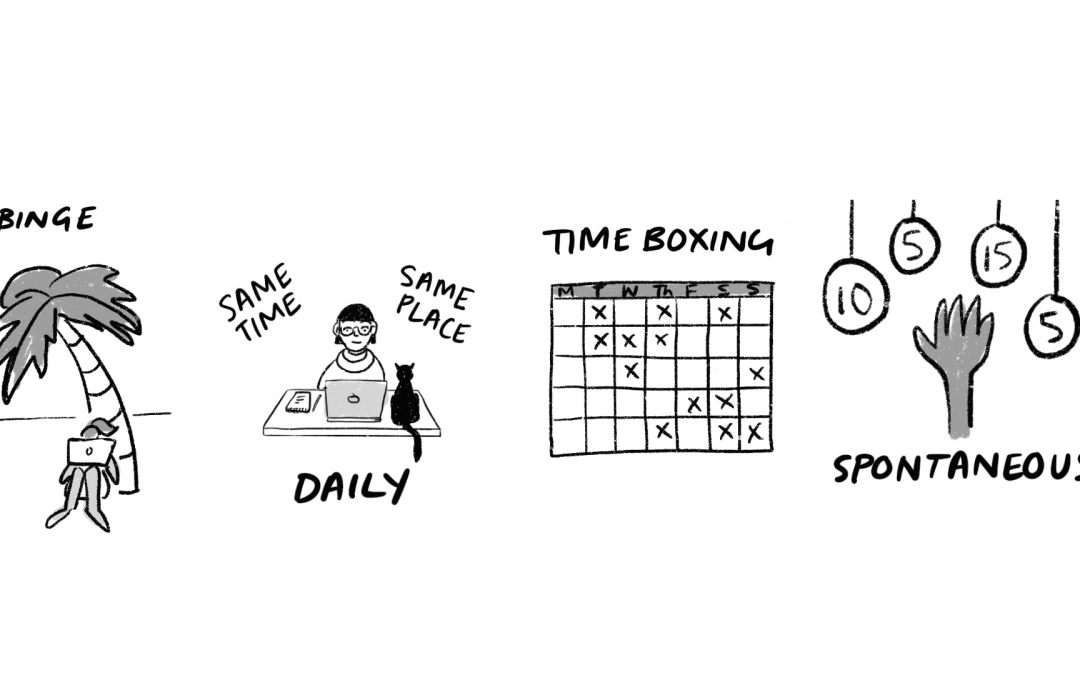Deep workers book long session to binge write. They might not write very regularly but they can be extremely productive if they plan ahead. Find out how to avoid the pitfalls of binge writing. Create a deep work routine and make the most of this approach to finding time to write.
The 4 approaches for making time to write
There is no one-size fits all solution to making time time to write. However, we’ve asked over 3,500 writers how they fit writing into their life and found four approaches. These include writing every day, scheduling writing across a week or two, spontaneous writing and going deep to binge write.
This post explores how to make the most of a deep work writing routine. But, explore the others and keep experimenting – it’s only by trying different approaches that you find what works for you right now. How you write will change over your current writing project, between different types and genres of writing and across your writing life.
>> Read more: How to make time to write – 4 approaches to finding time in busy schedules
The binge writer books long sessions for writing
For some writers, life is scheduled dawn to dusk, without a gap or a moment to spare. Instead of creating a daily or weekly routine, they find time every month or so to binge write.
This isn’t deadline-driven panic-writing, but scheduled sessions of uninterrupted deep work – days that are as productive as they are rare.
Benefits of going deep
Binge writers are independent writers who thrive working alone – solitude and isolation helps avoid distraction and provides the perfect environment to make significant progress over hours at a time.
“An independent writer who makes the most of rare but hyper-productive binge writing sessions”
Downsides of writing rarely
Binge writers are prone to raised expectations and perfectionist tendencies – craving the ideal conditions to write can induce stress before a writing retreat. This has been found to lead to panic and overwhelm and ultimately writers’ block.
Whilst this approach can work, it can lead to a poor work/life balance where you resent the time you can’t write.
Research also shows that ‘binge’ writers are the least productive and more likely to feel depressed and bad about their writing.
How to binge write effectively
In the 1980s Dr Robert Boice identified a type of writer who indulged in patterns of what he called binge writing.
Bingeing is a period of excessive indulgence in an activity. It most often describes a way of eating, but can be applied to all sorts of activities including exercise, cleaning and watching TV. Boice defined binge writing as hypomanic, euphoric, marathon sessions to meet unrealistic deadlines. In his study* he compared binge writers with those that wrote in brief daily sessions, and found that the bingers:
- wrote significantly less
- listed fewer creative ideas for writing
- got fewer editorial acceptances
- didn’t progress as far in their career
- scored higher on tests for depression.
While long intense sessions might get the words on the page, they come with an emotional cost and results in fewer creative ideas.
Boice went on to say that binge writing was counterproductive and potentially a source of depression and writers’ block: “Productive creativity seems to occur more reliably with moderation of work duration and of emotions, not with the fatigue and ensuing depression of binge writing.”
>> Read more: Binge writing – reclaim your route to writing productivity
From bingeing to deep work
However, for many people binge writing is the only option available to them. Many writers are unable to write anything for weeks, then have an intense period of writing. That’s the reality of their lives – bingeing is the only way they can find time to write, feel productive and make progress on their projects.
It is helpful to redefine what we mean by bingeing. Instead of focusing on Boice’s “hypomanic, euphoric, marathon sessions to meet unrealistic deadlines” reframe it as an intense period of writing scheduled within a period without writing.
Bingeing is no longer about panic, but about planning. It is not about rushing to meet deadlines but about scheduling time and giving yourself time to write.
Four tips from Cheryl Strayed to master productive binge writing
Once you embrace the reality of your over-committed schedule you can realistically plan to write. That’s exactly what happened to New York Times bestselling author Cheryl Strayed.
For a long time Strayed felt guilt and shame about her writing process – that she wasn’t a proper writer. She told productivity guru Tim Ferriss about her feeling of inadequacy on his award-winning podcast saying, “My name is Cheryl Strayed and I am a binge writer.’
She advised listeners: “It is really liberating to say, writing, like with life, you have to do it in a way that works for you.”
1 Make an intention and make it happen
It can be depressing when you realise how little time you have available to write. But if you can find some time you need to seize it for writing.
Strayed advises making an intention to write – a goal, a target, or just a mindset – and then stick to it. “It doesn’t matter what you should do,’ she says, “just make an intention and follow through with it. So, if all you can do is write one day a month, say ‘I’m going to take one day a month that’s all I’m doing’. That’s twelve good days a year, there’s a lot of writing you can get done.”
2 Schedule it and stop feeling bad
Deep work is about scheduling. Not only is this a super practical way to organise your time, it also squashes any feelings of guilt. Sometimes you’re too busy to write, so get over it, and stopping fretting.
Strayed first works out when she can’t write, then finds times that she can write. Once she’s found a block of time to write – however far away it might be, she releases herself “from any kind of guilt or shame that I should be writing when I’m not writing. And the counterpoint to that, is to say: I am going to write on these days or these months. I try to arrange my life so that happens.”
>> Read more: Prioritize your writing – make writing matter and make it happen
3 Find your version of a retreat
Deep work is about immersion, a retreat from the demands of normal life to focus solely on writing. We can’t all run away to a cabin in the woods to write, but there will be a version of a retreat that’s available to you – book a baby sitter and go to your local library or work from a neighbour’s house while they’re at work. It might require some thought, but it doesn’t have to cost you anything.
Strayed checked into a hotel down the street for two nights. She told her husband: “I’m going to be gone for 48 hours – don’t call me unless somebody stops breathing. I’m going to work and I’m going to get more work done in those 48 hours than I got done for weeks at home.”
4 Get into flow
You’ve found the time and the place, it might have cost you money or favours owed, so make the most of it. Embrace the time limitations, stop faffing and get into a groove.
As Strayed said, “when you only have 48 hours, and your time is limited and therefore it was really valuable and I got into the flow.”
If you get blocked on a session use methods like Pomodoro to keep you focussed or freewriting to overcome any blocks.
Finally, keep positive
Don’t succumb to the feelings of overwhelm most commonly associated with binge writing. Instead, use down time between your writing retreats to research, gather ideas and make plans – there might not be time for writing, but you can keep your project in mind and make progress with related activities.
There will be long gaps between your writing sessions so make sure you have everything lined up when you are ready to write.
Your writing sessions are so few and far between that you can’t afford to procrastinate when you have one coming up.
Don’t be too ambitious with what you can achieve – while having a stretch goal will keep you motivated, you might be overly optimistic, so celebrate what progress you make, notice what’s achievable and learn to set realistic goals.
*Robert Boice, Procrastination, busyness and bingeing, Behaviour Research and Therapy, Volume 27, Issue 6, 1989, Pages 605-611




